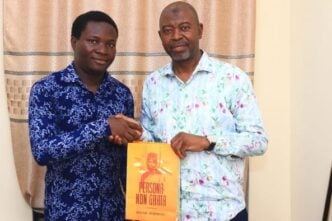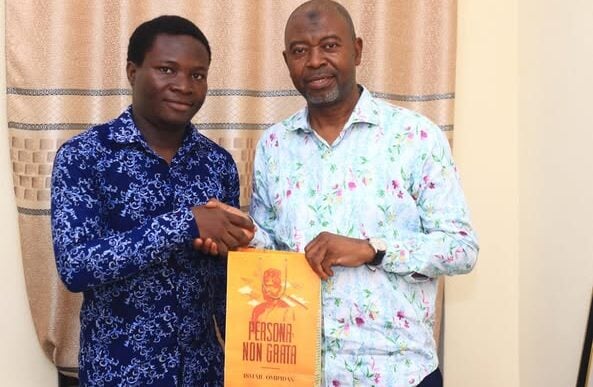Eedris Abdulkareem
In July 2006, John Street, Emeritus Professor in the School of Politics, Philosophy, Language and Communication Studies at the United States’ University of East Anglia, received a call from Wilfred Ngunjiri Nderitu, chairman of the Kenyan International Commission of Jurists (ICJ). Nderitu wanted Street to be an expert witness in a trial before the International Criminal Tribunal for Rwanda (ICTR). Simon Bikindi, a Rwandan musician, accused of inciting genocide via his songs during the 1994 Hutu-Tutsi war, was on trial. Bikindi, a Hutu from Gisenyi, the same region where assassinated Rwandan president, Juvenal Habyarimana, whose airplane was downed shortly before the genocide, was prominent in Rwanda in the 1980s and 1990s.
By the time of the genocide, Bikindi had a renown for composing and singing popular music songs, a mixture of rap and folk songs. He was described as having “elliptical lyrics and catchy tunes” and sang them in English, French and native Kinyarwanda. Bikindi was alleged to have sung songs played on Radio Television Libre des Mille Collines which incited genocide. He was also alleged to have associated with the extremist Hutu paramilitary militia Interahamwe which butchered Tutsis in their thousands.
At the end of the prolonged trial, though convicted, Bikindi could not be indicted on account of his songs with the title, “Nanga Abahutu,” – “I hate these Hutus”. Thus, on charge of “conspiracy to commit genocide,” having “composed, sang, recorded or distributed musical works extolling Hutu solidarity and accusing Tutsis of enslaving Hutus,” he was acquitted. He was however convicted of complicity to commit genocide, the court having confirmed that, prior to the genocide, Bikindi “consulted President Habyarimana” and, “during the 100 days of genocide from 7 April to 14 July 1994, Bikindi participated personally in the killings, both in Kigali and Gisenyi prefecture, and helped to recruit and organize Interahamwe militias.”
While sentencing Bikindi to 15 years imprisonment in December 2008, though proved beyond reasonable doubt that he participated in the killings, the court dismissed the charge that his songs had an inciting character. Corroborating this, Professor John Street, as well as the court, held that the charge of an inciting song was problematic “because of the troubling possibility of an artist being arbitrarily prosecuted for his work, art being open to a variety of interpretations.”
Advertisement
In his Music and politics, (2012) Prof Street says the divide between music and politics is very thin. Though this was not its first, the recent ban slammed by the National Broadcasting Commission (NBC) on Eedris Abdulkareem’s newly released song, ‘Seyi, Tell Your Papa’ has roused Nigerians to look out through the window to see the unholy dalliance between the Nigerian state and a defunct USSR organisation similar to the NBC called Gosteleradio. In a letter to all radio stations in Nigeria, the NBC banned airing of the song on all Nigerian airwaves, according to it, for violation of the tenets of its regulatory code.
When a protest song like Abdulkareem’s is censored by political power, or criminalized as was done in the Bikindi song’s trial, it reveals the paranoia of states and political regimes. Music does not just provide power of political expression, says Street, music is that expression. Unlike the hen and egg causal mystery, it is bad governance, governmental deception and authoritarianism that give birth to protest songs and not vice versa. It reminds me of three traditional chiefs, the Jagùnnà, Àró and the Odofin. When flies bit the Jagùnnà, the two other chiefs pretended they did not hear but when the time comes and the Jagùnnà began to barbecue the flies, both Àró and Ọ̀dọ̀fin cry blue murder. So, why are Villa’s Àró and Ọ̀dọ̀fin scared now when the people’s plights find expression in the lyrics of their bards?
The issues Abdulkareem dwelt on in that song litter the Nigerian street. He sang:“Seyi, how far? I swear your papa, no try—there are too many empty promises. On behalf of Nigerians, take our message to him. Kidnappers dey kill Nigerians. Try to travel by road without your security makes you feel the pains of fellow Nigerians. You dey fly private jets, insecurity no be your problem”. The song centres on misgovernance, hopelessness, deception, despair, failure and tyrannical power. Abdulkareem merely implored Tinubu’s spoilt brat child, Seyi, who he berated for embarking on an infantile combing of Nigerian northern states in gleaming automobiles, to dispatch his message to his father. It is a bold and courageous deployment of music as a tool and weapon of political commentary By the way, I am curious at why Seyi’s crowd-sourcing is centred in the north and not the south? Was it because he needed the Rankadede genuflection which he can get in the north but can never have in the south where such grovelling before father and son is an anathema?
Advertisement
This takes me to Uganda. In Africa’s world of the 1970s, awash with military despotism, Uganda stood out. The famous unwritten cliche about Africa was, “look towards Uganda.” It was a country of hyperbole, metaphor, symbolism and oxymoron. In Uganda, you had the grotesque, the weird and the outright bizarre rolled into a single ball. It was a theatre of the surreal. Like the mountainous size of its despot, Idi Amin Dada, Uganda was huge on the laughable. For instance, to demonstrate his male power dominance, Dada sent love letters to Queen Elizabeth II of England, asking for her hand in marriage so that he could become the King of Scotland. He indeed conferred himself with the title, “Conqueror of the British Empire”. To demonstrate this, he physically rode his elephantine weight on the backs of British workers in Kampala. At the peak of his squabble with Tanzanian leader, Julius Nyerere, Amin sent a love letter telegram to Nyerere. In it, he described the man famously known as Walimu as such a good and sultry fellow, so much that if was a woman, he would give serious consideration to marrying him, regardless of his grizzled head.
Nigeria is today wearing the shoes of Idi Amin Dada’s Uganda. All manner of the laughable and grotesque ooze out from Nigeria’s imperial palace. The global tariff war, borne out of Donald Trump’s implacable narcissism, is raging like a typhoon. The world is scampering to escape the wrath of its Achilles’ hill, a man labelled reincarnate of Adolf Hitler, whose own Aryan race – superior specimen of mankind – slogan is, Make America Great Again. Country leaders are dousing tensions, physically addressing their citizens and assuring them of home-grown ways out of the projected global economic tribulation. Ours is trapped in the beautiful city of Paris, hiding behind a finger of a claim that he is on “working visit”. But, why is Paris the beautiful bride of African leaders’ excitement? Decades ago, Mobutu Desire-Sese Seko, the Congolese tyrant, also made Paris his nesting comfort, spending Congo’s national patrimony on extravagant shopping trips in Paris and flying supersonic Concorde aircraft. Someday when we calculate Nigeria’s wealth squandered on this Paris hospice fancy, it may rival Mobutu’s.
When you look at the Abdulkareem song ban in its totality, you will realize that a tragic paradox is slowly building today in Nigeria. It is an electoral route to authoritarianism which comes through an off-the-cuff rise of institutions that make themselves the “Aj’itọ Ọba” of imperial power. In old Oyo empire, with a system of infallibility and God-ordained status of the monarch, the Aj’itọ Ọba confirmed the All-mightiness and deity attribution of the king. He is entrusted with the role of licking the king’s spittle. He cleaned the monarch’s mess and dared not exhibit any form of revulsion to it. Today, what a smart despot does is to make state institutions lend themselves as executioners of democracy. This reminds me of Steven Levitsky and Daniel Ziblatt’s submission in their How democracies die that those who assassinate democracy use its very institutions to gradually, subtly and even legally, kill it.
Freedom of expression, of course, with its caveats, is a major kernel of democracy. When autocrats set out on a path of strangulating democracy, the first thing they do is to muffle free speech. During the rules of Amins, Sani Abachas, Francisco Macìas Nguemas, et al, their terror against freedom of expression was overt. Now, with the world being a global village, institutional tyrannies have been on the upswing. They are buoyed by Italian philosopher, Antonio Gramsci’s theory of cultural hegemony which teaches tyrants that, in the bid to put a leash on voices of dissents, cultural institutions and ideas, rather than just raw brute and force, hold the key. Institutions are gradually replacing the Aj’itọ Ọba, becoming the new lickspittle of imperial power.
Advertisement
As the ‘mass’ in the mass media is being gradually corroded over the decades, chief among its reasons being economic meltdown, the radio and social media have conveniently become the media outlets with the ‘mass’ of the 21st century. Their audiences are spontaneous, massive and equal the audience of newspaper press of the 20th and early 21sr centuries. It is why the attention of modern totalitarian governments is focused on them. They find them easy objects to tweak in the service of personal rule. The NBC, the regulatory body for broadcasting in Nigeria, has become a formidable lickspittle of presidential power. From the days of Muhammadu Buhari, the NBC has helped gag free speech. It capitalises on its role as an industry regulator, entrusted with the business of regulating and controlling the levers of broadcasting industry in Nigeria to do this.
NBC was patterned after the “Gosteleradio”. An abbreviation for the Russian “State Committee for Television and Radio Broadcasting of the Soviet Union” which was in existence from 1931, until the collapse of the Soviet Union in 1991, Joseph Stalin used it to stave off dissent against his infernal rule. The NBC has acted same way. Gosteleradio was the primary state body responsible for overseeing all television and radio broadcasting in the Soviet Union. A powerful organization which exerted significant control over all broadcasts within the defunct USSR, Gosteleradio served as the central authority for decision-making related to broadcasting content, forcefully maintaining a stranglehold on broadcast content’s alignment with the state’s ideology and political goals.
Thus, like the Gosteleradio, Nigerian broadcasters narrate their agonizing ordeals under the NBC as akin to Third Reich’s. NBC is an Omnipotent power with millions of ears like a sieve (ab’etilukara bi ajere). Like a Gestapo, it snouts round for infractions. Aware of the power of financial emasculation to broadcast stations, every word spoken against presidential power on radio is tantamount to treason. Fines, like gags on the mouths of captives in the trans-Atlantic slave trade era, are slammed on stations which dare broadcast criticisms of imperial power.
It is not as if the folks at NBC are not equally recipients of the misgovernance that has become ten a dime in the polity. It is not that their lives have not witnessed phenomenal regression since 2023. NBC’s readiness to lend itself as platform for criminalization of free speech is a pattern noticeable at the outset of authoritarianism. Some weeks ago, the National Youth Service Corps (NYSC) did same when it forced a youth corps member to apologize for voicing her frustration with the Nigerian economy.
Advertisement
The folks at NBC are not unaware that banning Abdulkareem’s song will increase its listening audience. Like the Aj’itọ Ọba, the name of the game is grovelling by an authoritarian power inclined towards stomping on dissent. The banning of songs by artists by dictatorial governments has never worked. It makes it available to a wider spectrum of inquisitive audiences whose minds cohere with the message in the banned songs.
As it is happening today with Abdulkareem’s song, in June 1976, as a response to victimisation by Jamaican police of smokers of cannabis and as a political push for its legalization due to its medical use, Jamaican reggae musician, Peter Tosh, released his debut studio album named Legalize It. He even predicted in an interview in 1978 that “Herb will become like cigarettes”. The Jamaican government immediately banned the album from being aired on radio or television. After its release in 1976 in America, the album appeared on the Billboard 200 album chart for two weeks and peaked at No. 199. Twenty-three years later, it was certified platinum by the Recording Industry Association of America, having sold more than one million copies. It was also included in the 2005 book 1001 Albums You Must Hear Before You Die.
Advertisement
For a government that wants the people to continually say Rankadede to those who purvey hunger and despondency, we need more of Eedris Abdulkareem. The letters of the acquittal of Simon Bikindi (not his actual involvement in the Rwandan genocide) show that protest music is not criminal. It is soothing to the souls of suffering people.
Olunloyo: Goodnight, Voltaire
Advertisement
At his ancient ‘imperial’ home in Molete, Ibadan last Thursday, I wrote in the condolence register: “He was a man, like French philosopher, Voltaire, who had trapped inside a single skull the brains of generations”.
When I met Victor Omololu Sowemimo Olunloyo (VOS) for the first time in 1995, the facade of scales that decorated my eyes about him began to drop. If you followed the 1983 Nigerian elections, especially in the old Oyo State, you couldn’t like VOS. Gradually, on meeting him visiting the newsroom of the Nigerian Tribune, all negative typecasts of him began to thaw and flow away like a huge ice in the sun. By the time he died last week Sunday, with 30 years in between for me to learn and unlearn all the political profiling he was festooned with, I am left with the impression of a maverick, humanist and a Voltaire, the pseudonym of François-Marie Arouet.
Advertisement
Unlike many members of the political class of his time, Olunloyo was a humanist par excellence and who, like Voltaire, had wit sewn to his soul. He was a man high up there who was very much at home with the low. He engaged ordinary reporters like us and never bothered to go in to see our editors. If, like Voltaire did in February 1778 when his presumed death was afoot, Olunloyo had same opportunity to write his own epithet, his would be similar to this French philosopher of the Enlightenment who wrote, “I die adoring God, loving my friends, not hating my enemies, and detesting superstition.” Though Olunloyo was a mathematician and a scientist, he however didn’t, like Ludwig Wittgenstein, abhor metaphysics.
When I visited him in 2022 at the University College Hospital, (UCH) in the company of another mentee of his, Lasisi Olagunju, amid rumours that he had passed, it was difficult not to believe that his time of departure had not come. Heavily intubated with an oxygen ‘noose’ across his nose, upon sighting me, his wit was at its octane. “Iwo boy onikokuko yi ti de” (You this satanic writer has come”, he said, wearing his trademark mask of a smile that was native to only him.
Last Sunday when the news of his demise exploded like a bomb, downcast, I saw it as confirmation of my 30-year-old fear. Whenever Olunloyo died, I voiced out several times in the last three decades, humanity would be witnessing the gutting of a modern-ancient library. I asked everyone in sight how we could download him all that were inside his brain before death came calling. My wish couldn’t fructify. Whether as an interviewee or guest at his Molete home, you would scoop tomes of knowledge from history, philosophy, music, science, engineering, mathematics to religion and associated disciplines; knowledge which you may never encounter in books.
I remember him once narrating to me how Bode Thomas died, the hospital he was taken to and how he eventually succumbed to the death that killed him after a strange person visited him.
So, on Thursday, his gardener of over two decades told us that a few days before his death, Olunloyo told him to go clean up the library – and he did. But the connoisseur of knowledge never got near that house of books by the time death came. When I heard and reflected on this, it dawned on me that the totality of VOS’s life was wrapped around books. Tears in his misty eyes, Salisu, a native of Kano, did not know the time he stuttered, “Daddy ya tefi!” To Olunloyo, humanity knows no tribe, and was borderless in his consideration. Samson, his driver of over three decades, also doubled as his librarian. Many times, when VOS, sitting in his library, asked him to go pick a book from a particular section of the shelf and the driver told him it was not there, Olunloyo, who knew the geography of virtually all his books and the particular shelves where they were, told Samson he must have rearranged it.
Olagunju told me another story which encapsulated his lifelong bonding with books. His walks circumscribed by the wheelchair on which he was bound, one day in January this year when he went to Molete to meet Olunloyo, he was shocked to see him on the second floor of the building where his library is situated. How did he get there? Intuitively conscious, he told Olagunju he could see from his eyes that he was not happy seeing him being carried up and down the stairs. Olunloyo then muttered, “Agba niyen” – that is old age for you.
He had a stroke in 2022 and was presumed dead. He came back from coma to joke about that electrifying moment. We were there in Molete with him; Olagunju, myself and Dupe Olubanjo. “What did you see when you ‘died’?” Olagunju asked him. He cast a look at the journalist and said: “Nothing. I saw nothing.”
The last time I saw Olunloyo was towards the end of last year, at his Molete home. Frail, totally grizzled and sitting on a wheelchair, his voice rang like a nightingale’s and his intellect razor sharp. It was a confirmation that though the body had become complicit in the ploy to whittle him, what lay inside of him was stronger than that ploy. His wit was undiminished with his brilliance intact.
VOS was a humanist to the core. Inside the condolence register opened for him in Molete was the testament of a woman who, in 1994, as a reporter with the Tribune newspaper, lost her child at birth. Olunloyo heard of it and looked for her and paid her family a visit. When the woman eventually had another baby, VO drove down to Tribune to celebrate with her. He then narrated the chilling story of a relation of his who had a similar experience but never had a child again. Olunloyo gave the lady journalist a sum that was more than what she earned as salary.
Still on our Thursday condolence visit to his Molete home. It was heartwarming seeing the peace and amity of Olunloyo’s large family, a total disconnect from the madness rustled up by one of theirs on the social media. We met Gbenga, Funke and Olunloyo’s eldest child, extremely gracious and cool Auntie Yemi who proudly announced herself to us as 001. We met these well-read, well-bred and well-turnout children of our dead old friend who came home from across the world to celebrate the enviable memory of their dad. We met them in very high spirits. They were manifestly happy that they were bequeathed a legacy of purity, humanity and loving fatherhood. It was a delight that their bond could not be defined nor impeached by the obvious alien typecast of their father by some daughter whose presence of mind is on its usual flight.
Goodnight, our own Voltaire.
Views expressed by contributors are strictly personal and not of TheCable.








